When you think of healthcare careers in Singapore, what springs to mind? For many, it’s the iconic image of doctors in white coats, diligently attending to patients. But the reality is, the healthcare sector is far richer than many of us think. Behind every doctor is a team of nurses, radiographers, paramedics, medical technologists, researchers, and wellness experts keeping everything together.
Grab your lab goggles—let’s dive into the diverse selection of healthcare jobs in Singapore that go beyond the doctor’s office.
Key Takeaways
-
The healthcare sector offers a vast range of fulfilling jobs that extend far past traditional clinical roles.
- Roles like nursing and paramedicine focus on direct patient interaction, providing immediate support and hands-on care.
- Careers in life sciences and diagnostics are crucial for research, analysis, and medical innovation.
- Professions like sports science and exercise physiology emphasise rehabilitation, performance optimisation, and preventative health.
- PSB Academy offers a range of programmes and specialisations to help students and working adults build relevant skills for real-world healthcare environments.
Discovering Your Place in the Healthcare Sector
Whether you’re drawn to high-stakes action, behind-the-scenes science, or helping people get back on their feet, there’s a healthcare job just for you. Here’s how to find your niche.
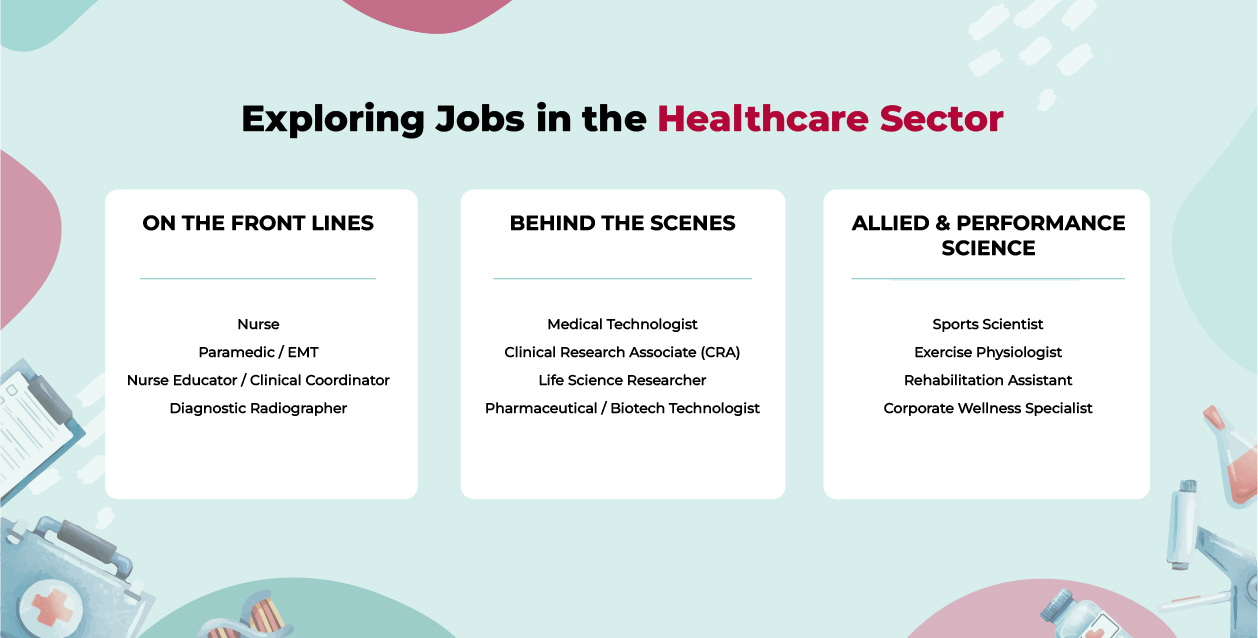
Careers on the Front Lines of Care

These healthcare jobs involve direct interaction with patients. Professionals in these roles provide hands-on support, manage acute situations, and deliver both short-term and long-term care.
1. Nurse: The Beating Heart of Healthcare
Nurses are integral to healthcare delivery. They assess patient needs, administer treatments, monitor recovery, and provide emotional support. In Singapore, nurses work across various settings, including hospitals, polyclinics, nursing homes, and community centres. As healthcare demand rises with an ageing population, the need for competent nurses is strong.
2. Paramedic/EMT: The Calm in Every Crisis
If you thrive under pressure and enjoy hands-on, dynamic work, a role in paramedicine may be for you. Paramedics and emergency medical technicians (EMTs) respond to medical emergencies, provide critical first aid, stabilise patients, and transport them to medical facilities. For this healthcare job, the ability to make quick, wise decisions under stress is key.
3. Nurse Educator or Clinical Coordinator: Guiding the Next Generation of Care
Not every nurse’s story ends at the bedside. For some, it’s just the beginning of a new chapter. With experience comes the opportunity to lead, mentor, and shape how healthcare is delivered. Nurse educators train the next generation of nursing professionals, design learning programmes, and uphold clinical standards across institutions. Clinical coordinators, on the other hand, keep the gears turning smoothly by managing healthcare operations, ensuring quality care, and bridging communication between departments.
4. Diagnostic Radiographers: Seeing What Others Can’t
Using tools like X-rays, CT scans, and MRIs, diagnostic radiographers help doctors understand what’s happening inside the body and plan the right course of action. It’s a healthcare job that blends technology, precision, and a keen eye for detail, all in the service of better care.
Healthcare Jobs That Go Behind the Scenes
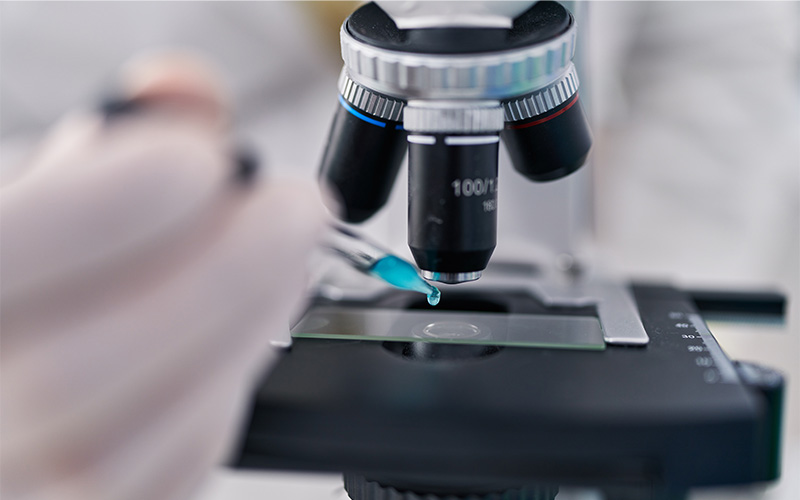
Not a people person? Prefer microscopes to small talk? Worry not; there is a dedicated realm of essential, non-clinical healthcare jobs that power the system.
1. Medical Technologist: The Detectives of Modern Medicine
Every time a doctor says, “We’ll need to run some tests,” that’s your cue. As a medical technologist, you’re in charge of analysing blood, tissue, and fluids to help diagnose diseases. Your findings provide essential insights that many doctors rely on to make informed treatment decisions.
2. Clinical Research Associate (CRA): Keeping Science Safe and Sound
Ever wondered how new drugs or medical devices make it to market? CRAs oversee clinical trials, ensuring that every step, from patient recruitment to data collection, meets strict scientific and ethical standards. They’re the link between researchers, healthcare providers, and regulatory bodies, making sure innovation never comes at the cost of safety.
3. Life Science Researcher: Pushing the Boundaries of Discovery
Think of this job as the R&D wing of healthcare. Life science researchers explore genetics, immunology, and microbiology—the fields that contribute to the development of vaccines, therapies, or diagnostics. Their work continues to play a vital role in advancing medical knowledge and improving health outcomes worldwide.
4. Pharmaceutical or Biotech Technologist: Turning Research into Real-World Impact
Once research yields results, someone has to turn them into safe, scalable products. That’s where biotech technologists come in. They help produce, refine, and test pharmaceuticals or health technologies, ensuring that every pill, vial, or device meets strict quality standards before reaching patients.
Allied Health and Performance-Focused Roles

Here’s where health and fitness meet recovery and preventive wellness. These allied healthcare jobs are about helping people move, heal, and thrive.
1. Sports Scientist: Turning Data into Performance and Prevention
Sports scientists don’t just help athletes run faster or lift heavier—they help them train smarter. By studying biomechanics, physiology, and movement patterns, they design programmes that improve performance while reducing the risk of injury. These professionals typically work with athletes and rehab specialists, helping them reach peak performance while keeping their bodies (and reflexes) in top shape.
2. Exercise Physiologist: Prescribing Movement for Recovery
If sports scientists focus on optimising performance, exercise physiologists focus on restoring it. They design clinical exercise programmes for patients recovering from injury, surgery, or chronic illness, using movement as a tool for healing. Whether it’s helping a cardiac patient rebuild stamina or improving joint strength after surgery, healthcare jobs in this field bridge science, therapy, and long-term recovery.
3. Rehabilitation Assistant: Supporting Every Step of the Journey
Think of rehab assistants as the right hand of physiotherapists and occupational therapists. They guide patients through exercises, monitor progress, and provide encouragement along the way. Unlike exercise physiologists, who plan and assess programmes, rehab assistants focus on hands-on implementation and patient support.
4. Corporate Wellness Specialist: Bringing Health Into the Workplace
While the other roles focus on treatment or performance, corporate wellness specialists play defence, preventing problems before they start. They design workplace initiatives that promote physical activity, ergonomics, and mental well-being, helping employees stay healthy and motivated. These healthcare jobs are where fitness, psychology, and business meet, proving that good health doesn’t just belong in hospitals or gyms.
How to Start Building Your Future in the Healthcare Sector
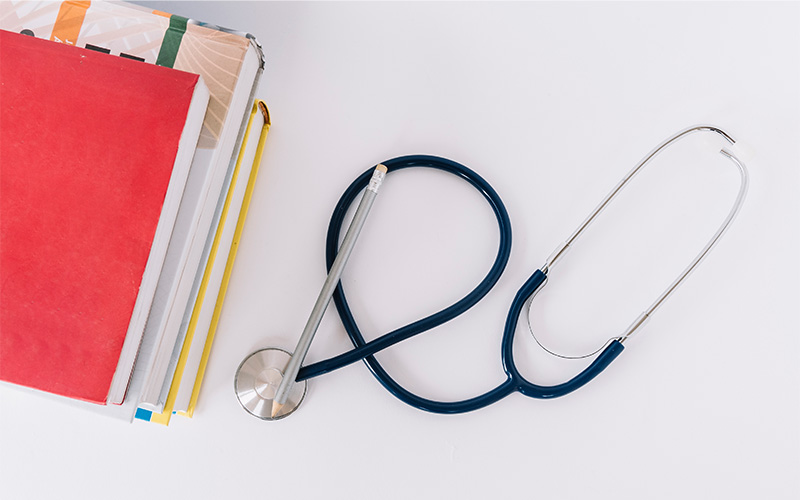
Knowing what healthcare jobs are out there is one thing; figuring out how to actually get there is another. Whether you’re fresh out of school or exploring your options, every journey starts with the right foundation. Here’s how you can start turning your interest in the healthcare sector into a real, rewarding career path.
What Education Pathways Can You Take in the Medical Field?

At PSB Academy, we offer a wide range of healthcare and science-related programmes designed to prepare you for real-world careers. From private diploma courses in Singapore to degree and postgraduate pathways, we combine theory with practical learning to build both knowledge and confidence. Each programme is developed with industry input and academic partnerships to ensure you’re learning what’s relevant to today’s healthcare environment.
Here’s a closer look at how different pathways can shape your career journey:
1. Life Sciences: Fueling Biomedical Innovation
Our Life Sciences programmes lay the foundation for understanding how biology, chemistry, and technology work together to drive modern healthcare. Students can delve into core scientific disciplines, such as biochemistry, molecular biology, and microbiology, gaining the essential knowledge to understand how living systems function. These courses also integrate applied fields like biotechnology, pharmaceutical science, and food and nutrition, providing a holistic perspective on healthcare.
This pathway is ideal for individuals targeting jobs in life sciences and healthcare, such as medical technologists, biomedical researchers, or quality control analysts.
2. Nursing: Advanced Clinical Practice and Leadership
Already a registered nurse (RN) with a diploma? The Bachelor of Nursing (Top-Up) programme (La Trobe University) can help you take your practice further. Delivered in collaboration with a recognised international university, this course builds significantly on existing nursing knowledge. It introduces advanced clinical and theoretical concepts, focusing on critical areas like patient safety, evidence-based practice, and healthcare management. It’s also designed to prepare nurses for leadership roles, specialised healthcare jobs, or progression into related master’s programmes.
3. Diagnostic Radiography and Imaging: The Future of Medical Visualisation
For individuals with diploma or degree qualifications in the science field, the Bachelor of Science (Honours) in Diagnostic Radiography and Imaging (University of Hertfordshire) offers a pathway to become a qualified radiographer in Singapore or abroad. The curriculum deepens your understanding of anatomy, imaging technology, and patient care, equipping you to operate advanced imaging systems and interpret diagnostic results. Students will also undergo clinical placements to gain hands-on experience in real healthcare settings, applying their skills under professional supervision.
4. Paramedicine: Enhancing Emergency Response Leadership
If you’re already working in emergency response and want to elevate your professional scope, consider the Bachelor of Science with Honours in Paramedic Science (Top-Up) (Coventry University). This programme is focused on advancing professional skills beyond basic emergency response, emphasising leadership, clinical reasoning, critical decision-making, and advanced patient management. It prepares paramedics to take on greater responsibilities in complex, high-pressure environments, including supervisory, training, or specialised jobs in emergency and community healthcare settings.
5. Sports Science: Optimising Human Performance and Health
Drawn to performance, rehabilitation, and preventative wellness? Our sports science programmes explore essential areas, such as exercise physiology (how the body responds to physical activity), biomechanics (the mechanics of human movement), and sports psychology. Pursuing a degree in sports science also opens doors to various specialisations and healthcare jobs, including sports therapy, exercise psychology, and coaching. Students will also get the chance to complete 140 hours of supervised work experience with industry partners, gaining valuable hands-on exposure through practicum placements.
Finding the Right Fit: Which Role Matches You?
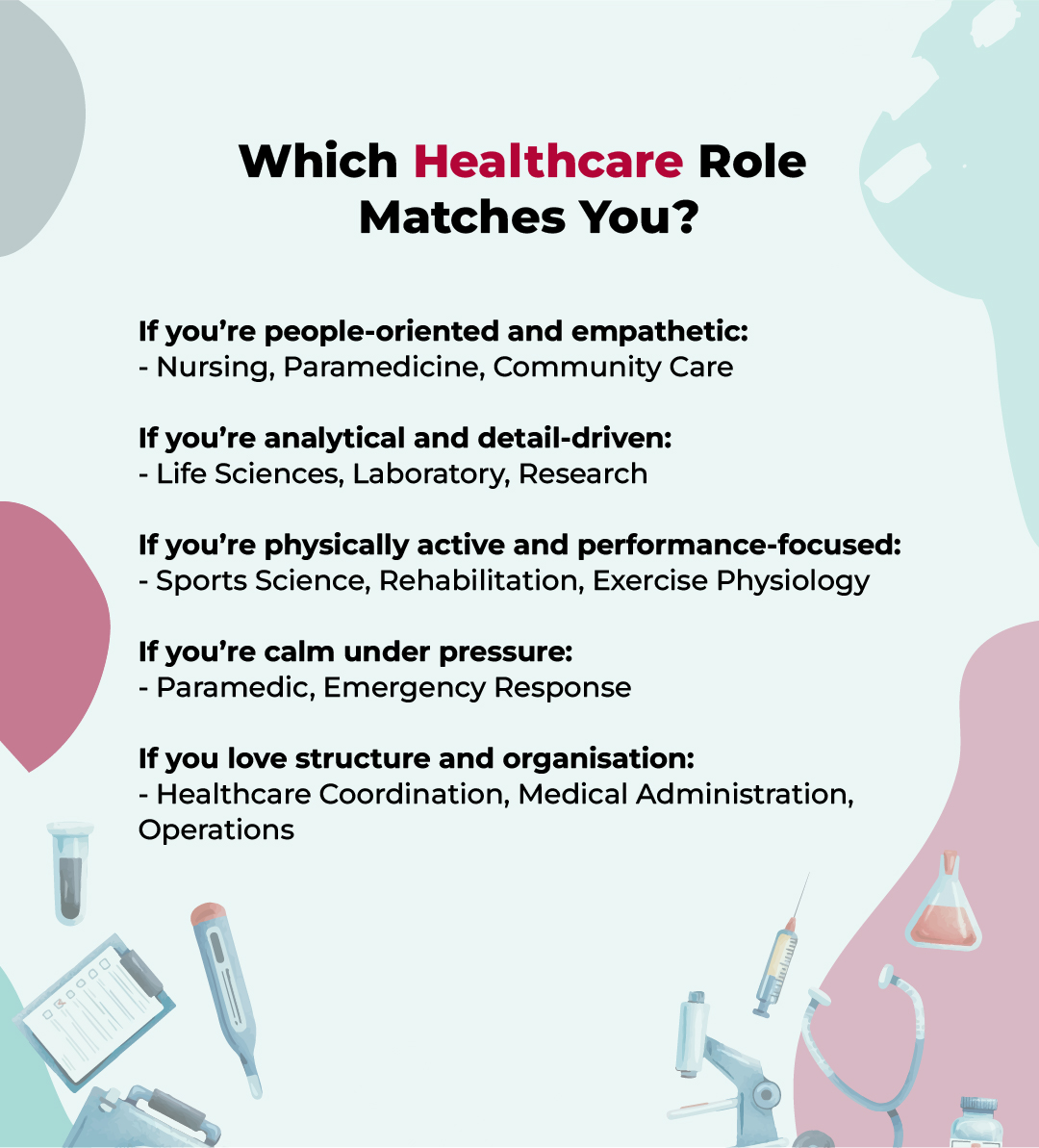
Feeling a bit overwhelmed by all the healthcare jobs and specialisations out there? That’s perfectly normal. The key is to reflect on your personality, preferences, and long-term career aspirations.
If you’re people-oriented and empathetic:
Nursing, paramedicine, or community care could be your niche. You’ll thrive on teamwork, human connection, and the satisfaction of making a direct impact on someone’s recovery or well-being. These healthcare jobs often require strong communication skills, emotional resilience, and the ability to stay calm when supporting patients and families through challenging moments.
If you’re analytical and detail-driven:
Life sciences, laboratory, or research roles will let your inner scientist shine. You’ll be working with data, experiments, and diagnostic tools that reveal insights about the human body and disease. Precision is key here; you’ll play a vital role in ensuring test accuracy, interpreting results, and contributing to scientific discoveries that shape future treatments.
If you’re physically active and performance-focused:
Consider sports science, rehabilitation, or exercise physiology. These healthcare jobs are ideal for anyone who loves staying active while helping others do the same. Expect a fast-paced, hands-on environment where coaching, training, and creative problem-solving keep every day exciting.
If you’re calm under pressure:
Paramedic or emergency response roles might be the adrenaline rush you’re looking for. You’ll be the first on the scene when crises strike, making split-second decisions that can change outcomes. It’s fast-paced and demanding but incredibly rewarding for those who can think clearly, stay composed, and take control when it matters most.
If you love structure and organisation:
Explore jobs in healthcare coordination, medical administration, or operations. You’ll be managing schedules, resources, and workflows to ensure that patient care runs smoothly behind the scenes. It’s perfect for those who enjoy planning, problem-solving, and seeing the bigger picture of how healthcare systems function.
Frequently Asked Questions
1. Can I switch into the healthcare sector if I’m mid-career?
It depends. For example, PSB Academy’s life sciences, nursing, and paramedicine undergraduate degree programmes are designed for those who already hold relevant diplomas or professional qualifications, such as RNs and certified paramedics.
If you’re looking to switch careers but don’t yet have the necessary qualifications, consider starting with a Foundation Diploma in Life Sciences (FDLS) or Diploma in Sports and Exercise Sciences (DSES). Both are pre-university foundational certificate courses in Singapore, designed to give NITEC and O-Level graduates a head start, leading to careers in life science and allied health.
2. I’m interested in healthcare but not comfortable with patient contact. What are my options?
You can explore roles in biomedical science, research, or analytics. These fields are essential to the healthcare system but typically do not involve direct or day-to-day patient interaction. Nursing and radiography, however, are patient-facing professions and will still require regular face-to-face communication, hands-on care, and interpersonal engagement. If you prefer to contribute from behind the scenes, lab-based or analytical healthcare jobs may be a better fit for your strengths and preferences.
3. What’s the difference between life sciences and sports science?
Life sciences focuses on biology, biomedical science, and research, making it ideal for those interested in lab work, diagnostics, or pharmaceuticals. Sports science, on the other hand, focuses on human performance, exercise physiology, and rehabilitation. Both fields contribute to healthcare in different ways, and the best choice depends on your interests and career goals.
Final Thoughts

Healthcare isn’t just about doctors and hospitals—it’s about people who care, innovate, and make a difference in countless ways. Whether you’re drawn to lab work, emergency care, or wellness coaching, explore exciting healthcare jobs where your strengths can truly shine.
At PSB Academy, we understand this dynamic landscape and are here to help you navigate it. Our diverse section of tertiary education pathways caters to learners at different stages, from foundation and diploma levels to degree and postgraduate studies.
Thinking about your next move? Talk to us and let us help you find the right path into healthcare.




 TOP
TOP


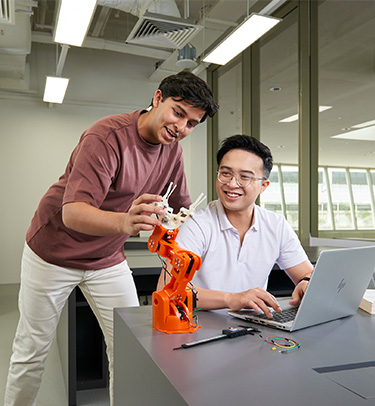
_2.png)

